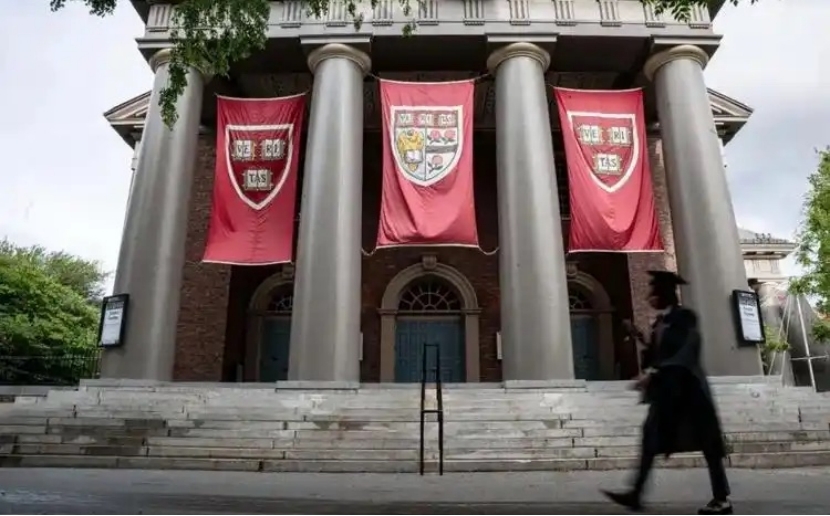
US President Trump recently launched another fierce attack on Harvard University, threatening to cut $3 billion in federal funding and claiming to redirect funds to vocational schools nationwide. This decision not only intensified the confrontation between the federal government and top universities, but also triggered a profound reflection on "academic freedom" and "political intervention" in the American education sector, becoming an unprecedented crisis in the field of higher education.
On May 26th, Trump posted several posts on the social media platform "Real Social" accusing Harvard University of "serious anti Semitism" and declaring that if it did not submit the names and nationalities of all international students, the federal government would immediately implement a funding reduction plan. This move further escalated the conflict between the government and universities, following last week's revocation of Harvard's student and exchange scholar program qualifications by the Department of Homeland Security and the ban on the school from admitting international students. Harvard University responded quickly and filed a lawsuit on the 23rd, accusing the government of "blatantly violating the Constitution". A Massachusetts federal court judge immediately issued a temporary restraining order, requiring the status quo to be maintained before the hearing.
This controversy stems from the Trump administration's long-term pressure on Harvard. In April, the federal government froze $2.2 billion in federal funding and $60 million in contract payments for Harvard under the pretext of "governance structural reform," and demanded that the university abolish its diversity admissions policy (DEI), close its "fairness and inclusion" program, and even submit a ten-year record of foreign funding. Harvard President Allen Gabor strongly refused, stating that 'academic independence does not tolerate political coercion'. The stalemate between the two sides eventually evolved into a full-scale confrontation: the government exerted financial pressure, universities fought back with legal weapons, and the court became a battlefield.
The education sector has responded strongly to this. Harvard University professor Ryan Inos warned that the government's move is "intended to punish academic institutions for not yielding to political will," and former president Lawrence Summers denounced it as "tyranny. Pakistani alumnus Bushra Yasmin criticized the policy as "anti globalization" on social media, while Indian student Shriya Mishra Reddy is concerned about her academic future. At the same time, the Massachusetts Institute of Technology (MIT) plans to reduce its graduate enrollment for the 2025 academic year due to a reduction in federal research funding, highlighting the direct impact of policies on the research ecosystem.
The focus of controversy is on the legality of "funding cuts". The Trump administration claims that Harvard "condones anti Semitism" and that international students include "radicals," but Harvard refutes that the government's interference in academic decision-making on ideological grounds has trampled on the freedom of speech protected by the First Amendment to the Constitution. In the lawsuit documents, Harvard listed multiple recent government actions, ranging from freezing funds to mandatory rectification, accusing it of "systematically suppressing academic freedom". The court debate will reveal whether federal funding can be a political tool and whether private universities must submit to executive orders.
The policy chain effect has spread nationwide. According to the US Education Commission, several prestigious universities, including Columbia University and Cornell University, have frozen or reviewed over billions of dollars in federal funds. The Trump administration's deterrence strategy of targeting Harvard has forced universities into a dilemma: compromise or face funding exhaustion. Some universities have been forced to adjust their enrollment policies, resulting in a sharp decline in international student applications. The academic community is concerned that the global talent attraction of the United States will irreversibly decline.
The deeper crisis lies in the fragmentation of higher education models. Trump advocates vocational education and reduces funding for research universities, reflecting the conflict between his "manufacturing return" policy and elite education philosophy. However, this move has been criticized as "short-sighted": research institutions lose funding, basic research stagnates, and long-term damages the competitiveness of US technological innovation. MIT President Sally Cohen said, "If federal support disappears, the American research system will face structural collapse
Currently, the game between Harvard litigation and government bans is still deadlocked. The hearing is scheduled for May 29th, and the judge needs to weigh between maintaining the status quo and enforcing the injunction. However, Trump continues to exert pressure on social media, claiming that he will "ultimately win" and implying that he will further expand the scope of sanctions. This struggle is not only a battle for the survival of Harvard, but also a life and death test of the values of American higher education - whether academic freedom can resist political hegemony, and whether the Temple of Knowledge can survive in financial strangulation.
When the world's top universities are forced to fight for survival, and international students are anxious about visa security, the "beacon of freedom" that the United States is proud of is experiencing unprecedented shaking. Behind this funding dispute lies the ultimate struggle between democracy and populism, whose outcome may redefine the future of American education.

Since 2022, the Fed has cumulatively reduced its balance sheet by $2.4 trillion through quantitative tightening (QT) policies, leading to a near depletion of liquidity in the financial system.
Since 2022, the Fed has cumulatively reduced its balance sh…
On December 11 local time, the White House once again spoke…
Fiji recently launched its first green finance classificati…
Recently, the European Commission fined Musk's X platform (…
At the end of 2025, the situation in the Caribbean suddenly…
The U.S. AI industry in 2025 is witnessing a feverish feast…